新标准大学英语4 B4U7教案
新目标大学英语第四册教案
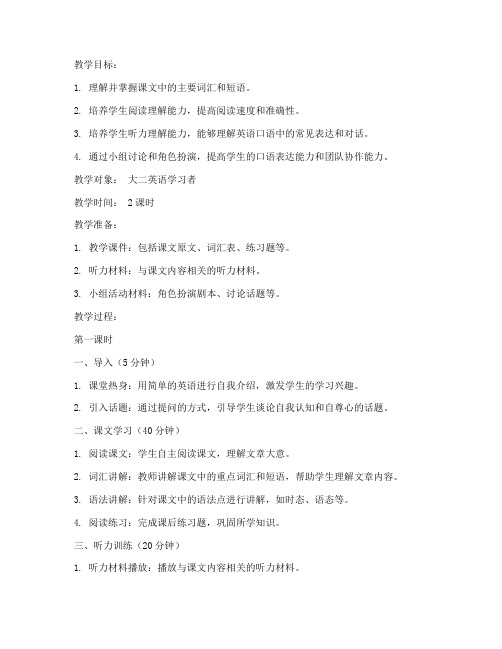
教学目标:1. 理解并掌握课文中的主要词汇和短语。
2. 培养学生阅读理解能力,提高阅读速度和准确性。
3. 培养学生听力理解能力,能够理解英语口语中的常见表达和对话。
4. 通过小组讨论和角色扮演,提高学生的口语表达能力和团队协作能力。
教学对象:大二英语学习者教学时间: 2课时教学准备:1. 教学课件:包括课文原文、词汇表、练习题等。
2. 听力材料:与课文内容相关的听力材料。
3. 小组活动材料:角色扮演剧本、讨论话题等。
教学过程:第一课时一、导入(5分钟)1. 课堂热身:用简单的英语进行自我介绍,激发学生的学习兴趣。
2. 引入话题:通过提问的方式,引导学生谈论自我认知和自尊心的话题。
二、课文学习(40分钟)1. 阅读课文:学生自主阅读课文,理解文章大意。
2. 词汇讲解:教师讲解课文中的重点词汇和短语,帮助学生理解文章内容。
3. 语法讲解:针对课文中的语法点进行讲解,如时态、语态等。
4. 阅读练习:完成课后练习题,巩固所学知识。
三、听力训练(20分钟)1. 听力材料播放:播放与课文内容相关的听力材料。
2. 听力理解:学生听后回答问题,教师进行讲解和点评。
四、小组活动(15分钟)1. 角色扮演:学生分组,根据课文内容进行角色扮演。
2. 小组讨论:围绕课文中的话题进行讨论,如自尊心的重要性、如何建立自尊心等。
第二课时一、复习(10分钟)1. 复习上节课学过的词汇和短语。
2. 回答上节课的听力问题。
二、深入阅读(30分钟)1. 阅读课文第二部分,理解文章细节。
2. 针对课文内容进行讨论,如文章中的观点、论证方法等。
三、口语练习(20分钟)1. 小组讨论:针对课文中的话题进行深入讨论。
2. 角色扮演:学生分组,根据课文内容进行角色扮演。
四、总结与作业布置(10分钟)1. 总结本节课的学习内容。
2. 布置课后作业:复习课文,完成课后练习题。
教学反思:本节课通过课文学习、听力训练、小组活动和口语练习等多种教学手段,帮助学生提高阅读理解能力和听力理解能力,同时培养学生的口语表达能力和团队协作能力。
大学英语第四册七单元教案
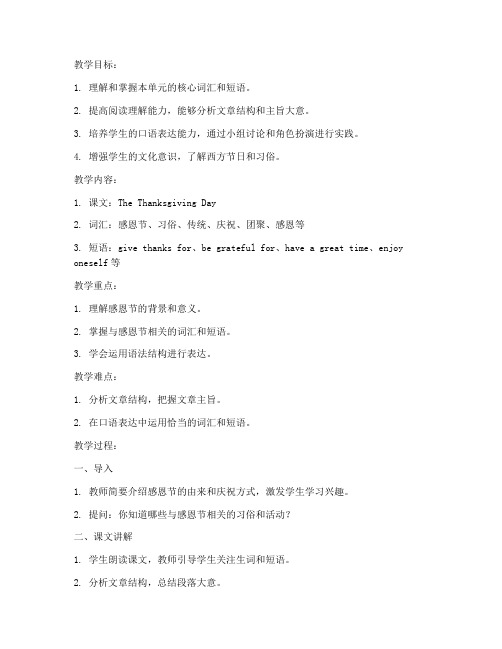
教学目标:1. 理解和掌握本单元的核心词汇和短语。
2. 提高阅读理解能力,能够分析文章结构和主旨大意。
3. 培养学生的口语表达能力,通过小组讨论和角色扮演进行实践。
4. 增强学生的文化意识,了解西方节日和习俗。
教学内容:1. 课文:The Thanksgiving Day2. 词汇:感恩节、习俗、传统、庆祝、团聚、感恩等3. 短语:give thanks for、be grateful for、have a great time、enjoy oneself等教学重点:1. 理解感恩节的背景和意义。
2. 掌握与感恩节相关的词汇和短语。
3. 学会运用语法结构进行表达。
教学难点:1. 分析文章结构,把握文章主旨。
2. 在口语表达中运用恰当的词汇和短语。
教学过程:一、导入1. 教师简要介绍感恩节的由来和庆祝方式,激发学生学习兴趣。
2. 提问:你知道哪些与感恩节相关的习俗和活动?二、课文讲解1. 学生朗读课文,教师引导学生关注生词和短语。
2. 分析文章结构,总结段落大意。
3. 解答学生提出的问题,强调重点词汇和短语。
三、词汇学习1. 教师带领学生回顾本单元的词汇,重点讲解与感恩节相关的词汇和短语。
2. 学生通过造句练习,巩固所学词汇。
四、语法讲解1. 教师讲解与感恩节相关的语法结构,如被动语态、虚拟语气等。
2. 学生进行语法练习,巩固所学语法知识。
五、口语练习1. 小组讨论:如何庆祝感恩节?分享自己的感恩故事。
2. 角色扮演:模拟家庭聚会,练习口语表达。
六、总结与作业1. 教师总结本节课所学内容,强调重点和难点。
2. 布置作业:(1)背诵课文;(2)写一篇关于感恩节的短文;(3)调查自己家庭庆祝感恩节的传统,与同学分享。
教学反思:本节课通过多种教学方法,如讲解、讨论、角色扮演等,帮助学生理解和掌握感恩节的相关知识。
在教学过程中,注重培养学生的阅读理解能力和口语表达能力。
同时,通过小组讨论和角色扮演,让学生在实践中运用所学知识,提高他们的实际应用能力。
新标准大学英语综合教程4课程设计
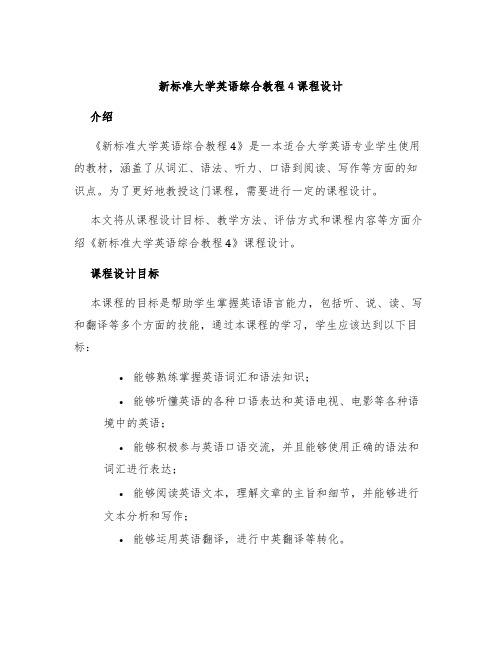
新标准大学英语综合教程4课程设计介绍《新标准大学英语综合教程4》是一本适合大学英语专业学生使用的教材,涵盖了从词汇、语法、听力、口语到阅读、写作等方面的知识点。
为了更好地教授这门课程,需要进行一定的课程设计。
本文将从课程设计目标、教学方法、评估方式和课程内容等方面介绍《新标准大学英语综合教程4》课程设计。
课程设计目标本课程的目标是帮助学生掌握英语语言能力,包括听、说、读、写和翻译等多个方面的技能,通过本课程的学习,学生应该达到以下目标:•能够熟练掌握英语词汇和语法知识;•能够听懂英语的各种口语表达和英语电视、电影等各种语境中的英语;•能够积极参与英语口语交流,并且能够使用正确的语法和词汇进行表达;•能够阅读英语文本,理解文章的主旨和细节,并能够进行文本分析和写作;•能够运用英语翻译,进行中英翻译等转化。
本课程将采用多种教学方法,以提高学生的学习兴趣和效果。
其中包括:情境教学法情境教学法是一种通过创造情境来引导学生学习的方法,以使得学生对所学知识更加深入的理解,并且能够运用到实际生活中。
在本课程中,将通过一些生活中常见的情境模拟,让学生亲身体验英语口语、阅读等各个方面,并能够更好地理解所学知识。
合作学习法合作学习法是一种通过互相协作,互相交流,完成任务的方法,既有利于学生更好地理解所学知识,也有利于培养学生的团队合作精神。
在本课程中,将采用合作学习法,让学生分组进行小组讨论,共同完成英语演讲、英语翻译等任务,从而培养学生的团队协作和沟通能力。
任务驱动教学法任务驱动教学法是一种通过任务让学生直接参与到学习活动中的教学方法,实践性强,能够有效地激发学生对知识的兴趣。
在本课程中,将采用任务驱动教学法,通过针对性的积极参与,完成各种英语任务的方式,来帮助学生更加深入地理解所学知识。
本课程将采用多种方式进行评估,以确定学生学习的效果和能力,其中包括:期中和期末考试期中和期末考试是本课程的一部分,它们将涵盖本课程中的所有知识点和技能,通过考试来验证学生有关英语方面的理解和应用能力。
新标准大学英语综合教程4-unit7
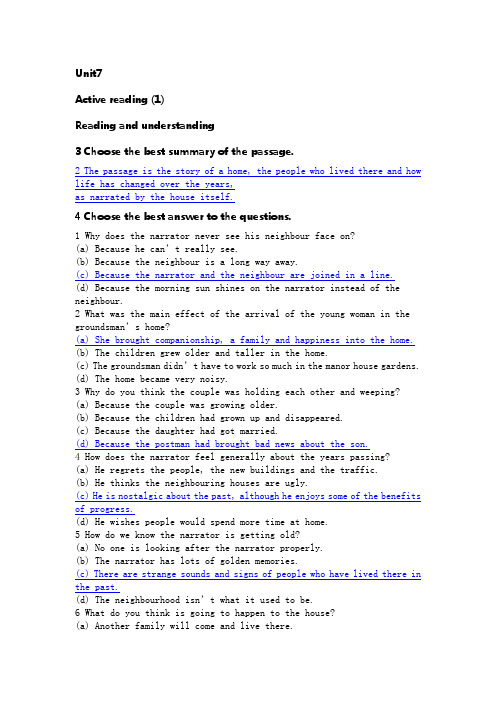
Unit7Active reading (1)Reading and understanding3 Choose the best summary of the passage.2 The passage is the story of a home, the people who lived there and how life has changed over the years,as narrated by the house itself.4 Choose the best answer to the questions.1 Why does the narrator never see his neighbour face on?(a) Because he can’t really see.(b) Because the neighbour is a long way away.(c) Because the narrator and the neighbour are joined in a line.(d) Because the morning sun shines on the narrator instead of the neighbour.2 What was the main effect of the arrival of the young woman in the groundsman’s home?(a) She brought companionship, a family and happiness into the home.(b) The children grew older and taller in the home.(c) The groundsman didn’t have to work so much in the manor house gardens.(d) The home became very noisy.3 Why do you think the couple was holding each other and weeping?(a) Because the couple was growing older.(b) Because the children had grown up and disappeared.(c) Because the daughter had got married.(d) Because the postman had brought bad news about the son.4 How does the narrator feel generally about the years passing?(a) He regrets the people, the new buildings and the traffic.(b) He thinks the neighbouring houses are ugly.(c) He is nostalgic about the past, although he enjoys some of the benefits of progress.(d) He wishes people would spend more time at home.5 How do we know the narrator is getting old?(a) No one is looking after the narrator properly.(b) The narrator has lots of golden memories.(c) There are strange sounds and signs of people who have lived there in the past.(d) The neighbourhood isn’t what it used to be.6 What do you think is going to happen to the house?(a) Another family will come and live there.(b) The traffic around it will get worse.(c) It’s going to be pulled down.(d) The workmen are going to use it as a workplace.Dealing with unfamiliar words5 Match the words in the box with their definitions.1 a small house built on land belonging to a large house (lodge)2 to provide furniture (furnish)3 feeling rough and hard (coarse)4 to put a piece of equipment somewhere and make it ready for use (install)5 to build something by putting parts together (assemble)6 a group of workers who do physical work (gang)7 a machine or piece of equipment that does a particular thing (device)8 a machine or a piece of equipment you have in your home (appliance)6 Complete the paragraph with the correct form of the words in Activity 5.When the (1) gang of workmen arrived, the (2) lodge was in a poor state of repair. They began by(3) installing electricity and then (4) assembled the various pieces ofa modern kitchen with all the best(5) appliances such as a washing machine and refrigerator. The walls were rather (6) coarse after years ofneglect, so they used a(n) (7) device to make them smooth again. Finally, they (8) furnished it with tables,chairs, sofas and beds, until the house was as comfortable as it used to be.7 Replace the underlined words with the correct form of the words in the box.1 The two buildings looked exactly the same from the outside, but were very different inside. (identical)2 When spring arrives the garden is full of flowers on the trees. (blossoms)3 The postman used to bring the mail in a large group of things tied together, but these days, we only getthe occasional letter. (bundle)4 She felt suddenly unconscious for a short time when she heard the dreadful news. (fainted)5 At the place where two or more roads meet, there are often queues of traffic. (crossroad)6 I sometimes feel unhappy and angry at the noise and traffic, but most of the time I ignore them. (resent)7 When you leave apples on the ground, they are gradually destroyed bya natural proces s, and can’t becollected and stored. (decay)8 Answer the questions about the words and expressions.1 Is a clearing likely to be (a) an area of woodland, or (b) an area in a wood where there are no trees?2 If something gleams, is it likely to be (a) bright, or (b) dull light?3 Is a riot of colours likely to be (a) just one or two, or (b) lots of different colours?4 If a child gurgles happily, is this likely to be (a) a low, or (b) a high-pitched sound?5 Is a metallic sound likely to be made by (a) something metal, or (b) wooden?6 If a dog howls, does it make (a) a long, loud sound, or (b) a weak, high sound?7 Is a creak likely to be a sound made by (a) something new, or (b) something old?8 If a gate has fallen off its hinges, is it likely to (a) open and shut normally, or (b) stay open?Reading and interpreting9 Look at the sentences from the passage and answer the questions.1 ... I do know that strangely, although we’re identical, we’re the exact opposite of each other ...Why are the house and its neighbour identical yet the exact opposite of each other?… sort of works for some of the information- though I have never seen such an arrangement. But thepreposition ‘over’ will not work, and surely there are two bedrooms –or what is the other room? Weknow it is not a bathroom- and if there are two bedrooms, how can you say the room arrangement is theopposite as in both cases there are two bedrooms?2 Soon there were children to look after too ...In what way does the house look after the children?The house provides shelter and keeps them warm and dry.3 I thought they looked rather coarse against my handsome stone.Does the house like the new brick houses being built? Why / Why not? No, he does not think brick is as fine a material as stone. The word coarse is negative in connotation.4 But we were all warm and clean, and although it was different, it wasn’tunpleasant.What does the house feel about progress?Fairly positive although a little nervous.5 My floorboards creak, and ghosts make strange noises throughout the night.If the house were a human, what would creaking floorboards and ghosts suggest? Old age with stiff muscles and many memories.6 Round the bend comes a large crane with a kind of ball and chain. I do hope it will go away.What do you think the crane is coming to do? Do you think it will go away? Balls are used to smash down walls so it sounds as if the building will be demolished rather thanrepaired. If so, the crane will not go away.Active reading (2)Reading and understanding3 Answer the questions.1 Why does the writer suggest that the first photos of Earth from space came as a shock?They offered a new perspective. They allowed us to see our planet from the outside.2 What does the passage suggest are the advantages of progress? People have more comfortable and longer lives.3 What are the disadvantages of progress?Population growth and as a result overuse of resources, pollution etc.4 In what ways are we similar to other people around the world?We consume similar products and services.5 In what ways are we different?We value our individualism and points of difference from others as reflected in the details of our homes.6 What does our home encourage us to do?Relax, be ourselves and look inward.7 Why is watching television ironic?It results in looking outwards at affairs beyond the home.8 How have the roles of women changed?They can follow careers outside the home and have much less time to be housewives.9 Why will it require wisdom and care to ensure people remain safe and satisfied in their homes?The modern world is pushing us towards uniformity and reducing freedom of choice. It will be difficultto balance this against what people want from their homes and lives. Changes to the family itself mayalso happen with unknown consequences.10 Why might planet Earth become unrecognizable?Homes with families and comfort may have disappeared.Dealing with unfamiliar words4 Match the words in the box with their definitions.1 to develop and make more modern (industrialize)2 to suffer something difficult or unpleasant patiently over a long period of time (endure)3 smooth-moving and attractive-looking (graceful)4 a strong feeling of dislike (hatred)5 to stop happening or continuing (cease)6 to take control of (conquer)7 intended, not done by chance or by accident (deliberate)5 Complete the sentences with the correct form of the words in Activity 4.1 Many animals, like the antelope and the swan, move with such grace that we humans can only admirethem.2 In the 17th century, the Founding Fathers escaped from England because their religion was hated by theEnglish, but their endurance allowed them to escape to North America and create the US.3 Industrialized nations have more social and fewer economic problems than developing countries.4 The US government deliberately chose the name the “Department of Homeland Security” in order tostress the importance of home.5 The conquest of space is one of the greatest achievements of the 20th century.6 There is an enduring nee d to remind ourselves that the Earth’s resources are finite.6 Replace the underlined words with the correct form of the words in the box.In comparison with small buildings, local communities, towns and cities, the Earth is (1) extremelylarge, but we call all of these our home, where we enjoy our (2) basic human right of clean water, adequatefood and personal security. Yet this right creates (3) extreme pressureon the Earth’s resources, and wemay feel that the human spirit contains an unusual self-destructive (4) characteristic. It’s as if we humanswork at the (5) main offices of planet Earth, building it and making it stronger and stronger, but with theability to bring it down and destroy it. (6) In the end, it’s our personal duty to leave the Earth as (7) wholeand undamaged as we found it when we arrived.Key: (1) immense (2) birthright (3) incredible (4) streak (5) headquarters(6) Ultimately (7) intact7 Answer the questions about the words and expressions.1 If buffalos roam, do they move (a) in a deliberate way, or (b) in no particular direction or without anypurpose?2 Is an emotive word likely to be one which causes (a) strong, or (b) weak feelings?3 If you hunker down, are you likely to (a) go out and look for trouble, or (b) look for a safe place toshelter?4 Is domain likely to be (a) an obligation of a particular person or a group, or (b) an area of activitytraditionally associated with them?5 Is a place that is habitable somewhere you can (a) live, or (b) travel to?6 If something is immoral, is it likely to be (a) right, or (b) wrong?7 If something takes an inordinate amount of time, does it take (a) a lot of time, or (b) little time?Language in useInversion1 Rewrite the sentences using inversion.1 The sound of children playing came from around the house.From around the house came the sound of children playing..2 More houses stood on top of the hill.On top of the hill stood more houses3 Horseless carriages passed in front of the house.In front of the house passed horseless carriages.4 Two middle-aged women lived here.Here lived two middle-aged women.5 A lorry stops at the front of the house.At the front of the house stops a lorry.6 A large crane comes round the bend.Round the bend comes a large crane.Granted, …2 Rewrite the sentences using Granted , …1 I admit that we recognized Earth from maps and drawings, but it was the first time we had seen photosof it.Granted, we recognized Earth from maps and drawings, but it was the first time we had seen photosof it.2 I admit it was familiar, but it was still unusual.Granted, it was familiar, but it was still unusual.3 I admit we could raise standards of living, but we also know that the growth of population is out ofcontrol.Granted, we could raise standards of living, but we also know that the growth of population is out ofcontrol.4 I admit we have learnt to like the same things, but we also recognize our individual natures.Granted, we have learnt to like the same things, but we also recognize our individual natures.5 I admit that women’s roles have changed, but men’s roles have not. Granted, women’s roles have changed, but men’s roles have not.binomials3 Complete the sentences with suitable binomials from the box.1 There are lots of good things to eat. You can pick and choose.2 His secretary looked very prim and proper and the whole meeting was very formal.3 When I write a story, I write the ending first, and then work backwards.I write back to front.4 When I go on holiday, I don’t want to do much. I just need some peace and quiet.5 Don’t worry, we’ll find your wallet sooner or later.6 This is the best I can do for this activity. Take it or leave it. Additional activityMatch the binomials with their meaning.1 d2 f3 j4 g5 a6 b7 i8 c9 h 10 ecollocations4 Complete the sentences with suitable expressions from the collocation box. Sometimes more than onecollocation is possible.1 The results led him to abandon his belief that the climate was not changing.2 The international community is a vague term used to refer to all the governments of the world.3 She is achieving great success / popularity as a designer of stylish home furnishings.4 The government is facing immense pressure to provide cheap housing for the growing population.5 The minister has set up a working party to look into the problem of homelessness.6 If you have a spare room, you could take in a student and make a little extra money.5 Translate the paragraphs into Chinese.In so many ways, we now share our home – and our homes – with so many others. From Australia toZambia, we wear baseball caps and watch Hollywood movies. Markets in Morocco sell radios made inSingapore, and we all watch television and enjoy the same type of programmes. Are people obliged to dothis, or do they simply want to?Yet at heart, while we have learnt –or have been taught? –to like and aspire towards the same things, werecognize a streak of individualism in ourselves, a consciousness of difference, of our own uniqueness.And when life on Earth gets overwhelming, people retreat into themselves, into their homes.The word home is an emotive one. It’s a deliberate choice to call the organization to protect the US fromterrorism the Department of Homeland Security. Home doesn’t mean just bricks and mortar, translated intohouse or housing in so many languages. Home is where we hunker down, take off our shoes and switch offfrom the outside world. It’s an inward-looking place, where we should feel safe. Our homes also show ourindividual sides, through the pictures on the wall, the favourite chair, the souvenirs from visits beyond ourhomes, our expression of choice, which remain unchanging day to day,symbols of a moment’s pause in anever-changing world.我们在许多方面和许多人共享我们各自的家——我们的家,从澳大利亚到赞比亚,人们都戴棒球帽,看好莱坞电影。
新标准小学英语第四册Module7教案(集体备课)
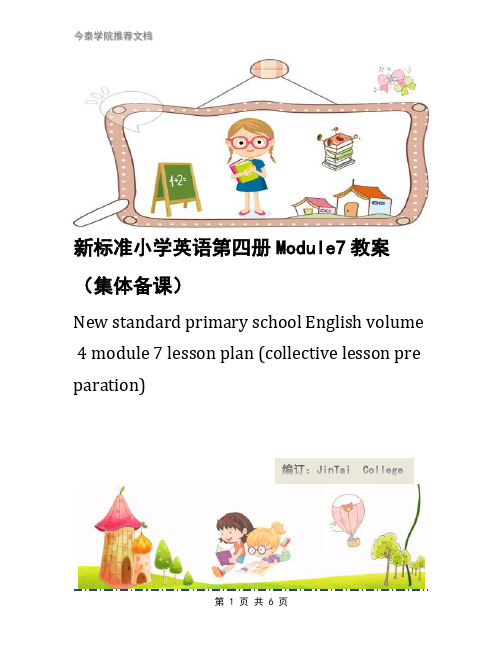
新标准小学英语第四册Module7教案(集体备课)New standard primary school English volume 4 module 7 lesson plan (collective lesson pre paration)新标准小学英语第四册Module7教案(集体备课)前言:小泰温馨提醒,英语作为在许多国际组织或者会议上都是必需语言,几乎所有学校选择英语作为其主要或唯一的外语必修课。
英语教学涉及多种专业理论知识,包括语言学、第二语言习得、词汇学、句法学、文体学、语料库理论、认知心理学等内容。
本教案根据英语课程标准的要求和针对教学对象是小学生群体的特点,将教学诸要素有序安排,确定合适的教学方案的设想和计划、并以启迪发展学生智力为根本目的。
便于学习和使用,本文下载后内容可随意修改调整及打印。
module 7 countriesunit 1 new york is in the east.teaching aimsa.aims on the knowledge :1)学会说美国著名城市new york \ san francisco\ washington d.c2)用east\ west\ north\ south来描述各城市的地理位置。
b.aims on the ability :1)培养学生的交际能力和创造能力,发展学生的个性。
2)拓展学生知识面,提高学生素质。
c. aims on the emotion : 让学生了解有关美国的一些知识,培养他们的跨文化意识和国际视野.the key and difficult points :正确使用方位词,了解美国的概况teaching tools : 地图、单词卡、录音机teaching procedures:step 1: warm up师生合唱上个模块歌曲i am the music manstep2: lead in教师在黑板上画一张美国国旗的简图,引导学生回答america并对其进行操练。
新标准第四册M4教案
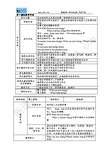
新课标第一网不用注册,免费下载!
大意。找出生词
请学生听录音, 情节。 勾出 ing 动词 听和读的情 况
听录音,跟读 引导学生说出答 勾出带有 ing 的 案,板书讲解操 动词 练,告诉学生,如 巩固练习 果要表示正在发 生的动作,可以 在动词后面加上 规律总结。 ing.
游戏激发学生的 关 注 学 生 的 兴趣,增强复习 兴趣点。 的有效性,同时 为引出重点句 型、词汇做好铺 垫。
听故事,感知故 事,重在让学生 在感知的基础上 理解。 是否了解故 事大意, 尤其 是“笑点 ” 。 生是否专注 于听与读
请学生找出课文 中的生词,板书, 操练,逐句讲解。 借助图的帮助, 进一步了解故事 进一步了解故事
板书设计
教学反思
课时进度
学 生 活 动 greeting
教 师 引 导 greeting
Step 2 Presentati 听动词短语做动 listen and do 说动 作 词短语做动作 on 问 学 生 : “Whatare you doing?” 引 导 学生回答。有 一 天 , LingLing 给 Amy 打了一 个电话,他们 新 课标第一网 都说了些什 么?我们一 起到课文里 看看吧! 放录音 Step 3 New lesson 开书,看图,听 录音 回答教师问题。 Y or N questions: 1Amy is drinking. 2Amy is eating.. 3 Amy is talking to LingLing. 4 Amy is playing with her train. 5 Tom is playing with her train. 引导学生正确回 答。
Step4 Practຫໍສະໝຸດ ce引导学生关注词 到短语,短语到 句子的变化。 让学生用所学语 造句。 法去完成真实的 任务,通过活动 学 生 的 语 音 放录音,请学生 树立学习英语的 准确度 听指读,巡视, 信心,获取一种 指导帮助。 成功的体验,从 听, 指 读 而激发和保持对 英语学习的兴 趣。 学生对已学 尝试与录音同步 知识的转移 读。不能读的就 和拓展 小声跟读,或用 手指句子顺序, 便于回家复习。 listen and say 跟读 教师问,引导全 让学生说, 练习。 班集体回答。 (限 定性活动) 新 课标第一 听,理解图片含 网 xk 义。回答教师问 题。 教师与 1 生示范 示范活动 活动(可用石头 剪子布积分游 中等生和学 听。 戏,让学生缓解 困生的情况。 疲劳,并乐于参 与口语练习) 巡视指导。 两人小组问答练 引导学生结果总 习 结,评价总结, 给学生练习的时 间。
全新大学英语4教案

教学目标:1. 通过本课程的学习,使学生掌握大学英语4的词汇、语法和听力、阅读、写作、翻译等基本技能。
2. 培养学生的英语思维和跨文化交际能力。
3. 提高学生的英语综合运用能力,为英语四级考试做好充分准备。
教学重点:1. 词汇:掌握本课程所要求的词汇,并能灵活运用。
2. 语法:掌握本课程所要求的语法知识,并能正确运用。
3. 听力:提高听力理解能力,能听懂日常生活中的英语对话和短文。
4. 阅读:提高阅读速度和理解能力,能读懂一般性英语文章。
5. 写作:提高写作能力,能写出符合英语表达习惯的短文。
6. 翻译:提高汉译英和英译汉的能力。
教学难点:1. 词汇的记忆和运用。
2. 语法知识的理解和运用。
3. 听力材料的理解和分析。
4. 阅读材料的理解和分析。
5. 写作技巧的掌握。
6. 翻译技巧的掌握。
教学进度安排:第一周:1. 介绍课程内容和教学目标。
2. 学习课文,讲解词汇和语法。
3. 听力训练:听懂日常生活中的英语对话和短文。
第二周:1. 继续学习课文,讲解词汇和语法。
2. 阅读训练:提高阅读速度和理解能力。
3. 写作训练:提高写作能力。
第三周:1. 学习课文,讲解词汇和语法。
2. 听力训练:听懂一般性英语文章。
3. 翻译训练:提高汉译英和英译汉的能力。
第四周:1. 继续学习课文,讲解词汇和语法。
2. 阅读训练:提高阅读速度和理解能力。
3. 写作训练:提高写作能力。
第五周:1. 学习课文,讲解词汇和语法。
2. 听力训练:听懂日常生活中的英语对话和短文。
3. 翻译训练:提高汉译英和英译汉的能力。
教学方法和手段:1. 采用多媒体教学手段,如PPT、视频、音频等,提高教学效果。
2. 结合教材和实际生活,讲解词汇和语法。
3. 通过课堂讨论、小组合作等方式,提高学生的参与度和积极性。
4. 定期进行听力、阅读、写作、翻译等练习,巩固所学知识。
教学评价:1. 课堂表现:学生的出勤率、课堂参与度、课堂纪律等。
2. 作业完成情况:学生的作业质量和完成情况。
全新版大学英语综合教程4 ppt电子教案Unit7
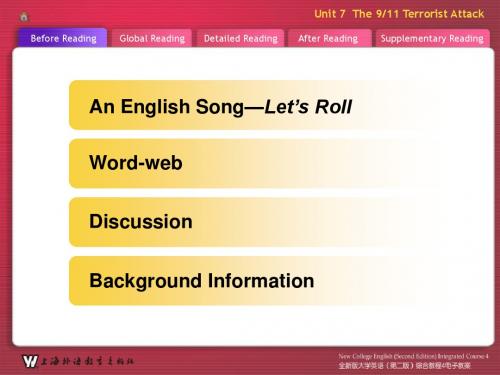
Unit 7 The 9/11 Terrorist Attack
Before Reading Global Reading Detailed Reading After Reading Supplementary Reading
Time is runnin’ out, let’s roll Time is runnin’ out, let’s roll
No one has the answers Detailed Reading But one thing is true evil You got to turn on ____ When it’s comin’ after you You got to face it down And when it tries to ____ hide You got to go in after it And never be denied
Time is runnin’ out, let’s roll Time is runnin’ out, let’s roll Time is runnin’ out, let’s roll
Unit 7 The 9/11 Terrorist Attack
Before Reading Global Reading Detailed Reading After Reading Supplementary Reading
He would sacrifice himself for justice.
Unit 7 The 9/11 Terrorist Attack
Before Reading Global Reading Detailed Reading After Reading Supplementary Reading
- 1、下载文档前请自行甄别文档内容的完整性,平台不提供额外的编辑、内容补充、找答案等附加服务。
- 2、"仅部分预览"的文档,不可在线预览部分如存在完整性等问题,可反馈申请退款(可完整预览的文档不适用该条件!)。
- 3、如文档侵犯您的权益,请联系客服反馈,我们会尽快为您处理(人工客服工作时间:9:00-18:30)。
Unit 7 No Place Like Home(New Standard English, Book 4)Section 1 Lead-inActivity 1 Home on the RangeDirections: Listen to the song and fill in the blanks with the missing words.Oh, give me a home where the buffalo roamWhere the deer and the antelope playWhere seldom is heard a discouraging wordAnd the skies are not cloudy all dayHome, home on the rangeHow often at night when the heavens are brightI see the light of those flickering starsHave I laid there amazed and asked, as I gazedIf their glory exceeds that of oursActivity 2 Design My Sweet HomeDirections: Watch the video. Work in pairs. Imagine your ideal home and discuss the questions.1 Where in the world would you like to live?--I would like a tropical island –Hai’nan would be s uitable2 What would it look like from the inside and outside?--Outside: a swimming pool , a big balcony , trees and plants, a blue roof.Inside: high ceilings, white tile floors, work room with book shelves and the latest computers, a large kitchen.3 What would you like to see when you look out of the window?--On one side the sea with palm trees and on the other my swimming pool with brightly coloured plants. Activity 3 Home AssociationsWhat do you associate with the idea of home?Activity 4 What’s Home?Directions: Fill in the blanks to complete the definition.A roof to keep out the rain?Four walls to keep out the wind?Floors to keep out the cold?Yes, but home is more than that.It is the laugh of a baby, the song of a mother, the strength of a father,warmth of loving hearts, lights from happy eyes, kindness, loyalty, and comradeship.Home is the first school for young ones,where they learn what is right, what is good and what is kind;where they go for comfort when they are hurt or sick;where joy is shared and sorrow eased;where fathers and mothers are respected and loved, and children are wanted;where the simplest food is good enough for kings because it is earned;where money is not as important as love and kindness;where even the tea kettle sings from happiness.That is home.Section 2 Active Reading Passage 1Golden MemoriesText organizationResidents (Para. 3-15)My feelingsFirst residents(para.3-8)the goundsman with a young womanMore residents (para.9)A smart man with his familyMore residents (para.10)Two middle-aged womenMore residents (para.12)I was soon filled with the sounds of conversation and laughterIt seemed as if no one spent much time at home any moreI like them because of the care they showed to my rooms and mygarden.I have to admit I resented.(P102 Ex. 9)1 (Para.2)... I do know that strangely, although we're identical, we're the exact opposite of each other ...Why are the house and its neighbour identical yet the exact opposite of each other?--The house and its neighbour have the same structure, but they are facing opposite ways, with the front door of the house f acing east, while its neighbour’s facing west.2 (Para.5) Soon there were children to look after too ...In what way does the house look after the children?--The house provides shelter and keeps them warm and dry.3 (Para.9) I thought they looked rather coarse against my handsome stone.Does the house like the new brick houses being built? Why / Why not?--No, he doesn’t think brick is as fine a material as stone. The word coarse is negative in connotation.4 (Para.10) But we were all warm an d clean, and although it was different, it wasn’t unpleasant.What does the house feel about progress?--Fairly positive although a little nervous.5 (Para.14) My floorboards creak, and ghosts make strange noises throughout the night.If the house were a human, what would creaking floorboards and ghosts suggest?The two words suggest old age with stiff muscles and many memories.6 (Para.16) Round the bend comes a large crane with a kind of ball and chain. I do hope it will go away.What do you think the crane is coming to do? Do you think it will go away?Balls are used to smash down walls, so it sounds as if the building will be demolished rather than repaired. If so, the crane will not go away.(P102, Ex. 10)1 Would you prefer to live in an old building or a new one, and why?-- A new one as it is likely to be more comfortable. I also like living high up, so I can get a good view.I think I prefer old buildings. They have more character, and I think they were better built in the old days.2 Do you think old houses should be saved and restored, or should they be pulled down and the land used to provide homes for more families?-- We don’t want everywhere to look the same. Old buildings make a place more interesting. A town exists in time as well as space.We must be practical. High-rise buildings can house far more people. Old houses waste land.3 To what extent do you think old buildings are part of the local or national heritage, or are they symbols of an unnecessary and sentimental attachment to the past?-- I think to try to protect all old buildings just because they are old would be, as the question says, “an unnecessary and sentimental attachment to the past”. But if the buildings are of historical significance, they are part of our heritage. Chinese culture is too old and valuable for us to simply forget the past.Golden MemoriesI can still remember the men who built the house. The master from the manor house found clearing in the huge orchard which ran up and down the hills. I only see my neighbour from the side. I’ve never seen him face on. Apart from the autumn, the groundsman brought a young woman home. I was filled with the sound of conversation and laughter. The woman looked after the garden around me; there was a riot of colours. With time goes by, they had children and then grew up. But one day, I saw a postman arrive with a bundle of letters, the woman cried out and fainted. Years later, they left without saying goodbye to me.Two middle-aged women spent several years here. I like them because they kept everything clean and tidy. The last person lived with me working at assembling furniture. We just kept each other company. He walked very slowly using his hands to steady himself.Time goes by, there are signs of everyone who has lived with me. However, there are my golden memories. But in fact, I look and feel my age.1.充满了欢声笑语2.五彩缤纷3.深秋4.穿着漂亮5.一摞信6.中年妇女7.干净整洁8.各式电器9.收破烂的1. be filled with the sounds of conversation and laughter2. a riot of colours3. late autumn4. dress smartly5. a bundle of letters6. middle-aged women7. clean and tidy8. all sorts of appliance9. rag-and-bone man.10.挖土刨坑11.组装家具12.互相做伴13.使某人稳住14.喘气15.腐烂的苹果16.拐弯处10. dig up11. assemble furniture12. keep each other company13. steady oneself14. catch one’s breath15. decaying apples16. round the bendSection 3 Active Reading Passage 2Home Thoughts1. 归属感2.西部荒原3.让人惊叹的照片4.令人震撼5.提高生活水平6.寿命延长一倍7.意识到自己与众不同8.席卷而去9.收拾家当10.宗教仇恨11.自由者的国土1. sense of belonging2. Wild West3. striking photos4. come as a shock5. raise the standards of living6. double lifespan7. consciousness of difference8. sweep away9. pack up10. religious hatred11. land of the free12.勇敢者的家园13.传统大家庭14.核心家庭12. home of the brave13. traditional extended family14. nuclear family1. Home is where we hunker down … It’s an inward-looking place, where we should feel safe. (Para 5)家是我们可以放松休息的地方,在家里我们脱下鞋子,忘掉外面那个纷扰的世界。
